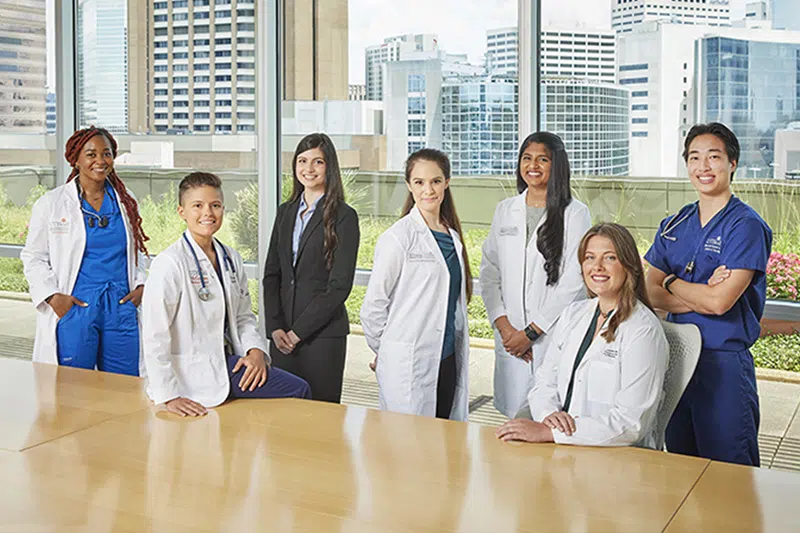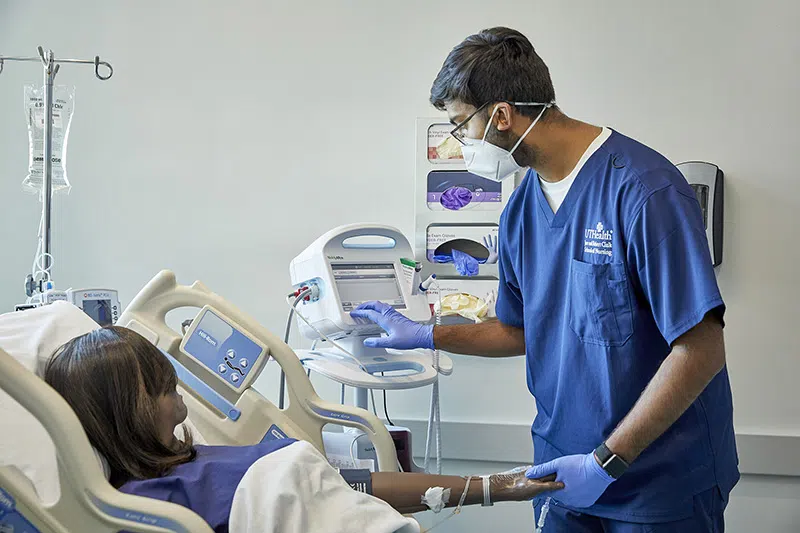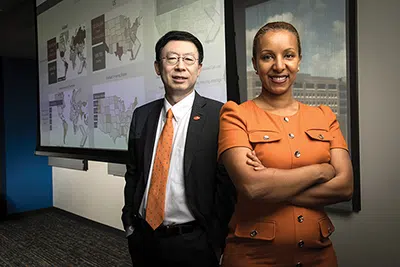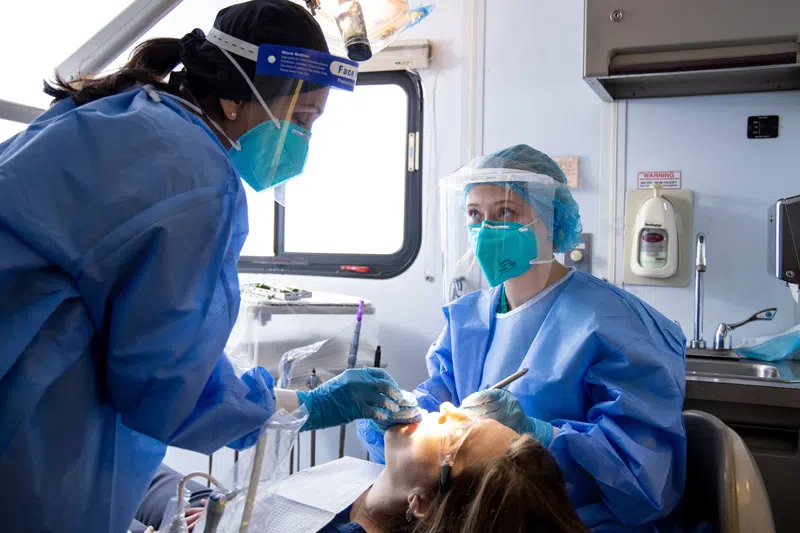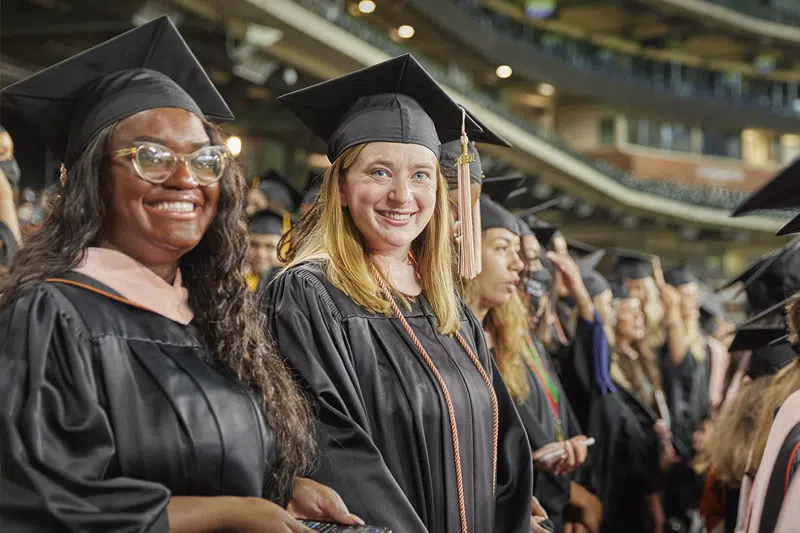Student loans are funds provided to undergraduate, graduate and/or professional students to help assist with educational expenses. Loans are considered self-help financial assistance and must be repaid.
For loan consideration, students must complete the Free Application for Federal Student Aid (FAFSA).
The following loan programs are available to students based on program enrollment, dependency status and eligibility:
UTHealth
Federal Loans
Institutional Loans
UTMDACC
Federal Loans
A student is ineligible for institutional, state and Federal Student Aid (FSA) funds if he/she is in default on an
FSA loan, owes an overpayment on an FSA grant or loan and has not made a repayment arrangement for the
default or overpayment. Additionally, a student is ineligible for FSA if his/her property is subject to a judgment
lien for a debt owed to the United States. A parent of a dependent student is ineligible for a PLUS loan if either
the student or parent is subject to such a lien.
FEDERAL LOANS
William D. Ford Federal Direct Subsidized Loan (Direct Subsidized)
The Direct Subsidized loan is an optional loan offered by the Department of Education. These loans are available to undergraduate students who demonstrate financial need as determined by the Department of Education. Direct Subsidized Loans assist with educational expenses but may not exceed financial need. The student is responsible for repaying the loan.
The interest rate for Direct Subsidized loans first disbursed on or after July 1, 2024, and before July 1, 2025 is 6.533%. No interest is charged while a student is enrolled at least half-time in an eligible school, for the first six months after leaving school (referred to as a grace period*) and during deferment periods. Interest rates are fixed for the life of the loan.
*Students receiving a Direct Subsidized Loan that is first disbursed between July 1, 2012 and July 1, 2014, will be responsible for paying any interest that accrues during the grace period. Any unpaid interest that accrues during the grade period will be added to the principal balance.
150% Direct Subsidized Loan Limit
In July 2012, Congress enacted the Moving Ahead for Progress in the 21st Century Act (MAP-21) [Public Law 112-141]. This law added a new stipulation to the Direct Loan statutory requirements which limits a first-time borrower’s eligibility for Direct Subsidized Loans to a period not to exceed 150% of the length of the borrower’s educational program.
Pursuant to this new provision under certain conditions, first-time borrowers who have exceeded the 150% limit will lose the interest subsidy on their Direct Subsidized Loans.
Only first-time borrowers on or after July 1, 2013 are subject to the new provision. A first-time borrower is generally defined as one who did not have an outstanding balance of principal or interest on a Direct or FFEL Program Loan on July 1, 2013.
William D. Ford Federal Direct Unsubsidized Loans (Direct Unsubsidized)
The Direct Unsubsidized loan is an optional loan offered by the Department of Education. These loans available to both undergraduate and graduate students and are not based on financial need as determined by the Department of Education. The student is responsible for repaying the loan.
Interest is charged during all periods; even during the time a student is enrolled at least-half time in an eligible school, during grace and deferment periods. The interest rate for Direct Unsubsidized loans first disbursed on or after July 1, 2024, and before July 1, 2025 is as follows:
- Undergraduate 6.533%
- Graduate 8.083%
Interest rates are fixed for the life of the loan.
Eligibility requirements for the Direct Subsidized/Unsubsidized Loan:
- Must be enrolled at least half-time in a degree-seeking program at a school that participates in the Direct Loan Program
- Must be a U.S. citizen or eligible non-citizen
- Must not be in default on any federal education loans or owe an overpayment on a federal education grant
- A student is ineligible for institutional, state and Federal Student Aid (FSA) funds if he/she is in default on an FSA loan, owes an overpayment on an FSA grant or loan and has not made a repayment arrangement for the default or overpayment. Additionally, a student is ineligible for FSA if his/her property is subject to a judgment lien for a debt owed to the United States
To apply for the Direct Subsidized and/or Unsubsidized Loans:
William D. Ford Federal Direct PLUS Loan (Parent PLUS) - Dependent Students
Parent PLUS loans are interest-bearing loans for the parents of dependent students who are enrolled at least half-time in a degree-seeking program at an eligible school. This loan assists with educational expenses up to the student’s cost of attendance minus all other assistance. The parent is responsible for repaying the loan.
The interest rate for the Parent PLUS loan first disbursed on or after July 1, 2024, and before July 1, 2025 is 9.083%. Interest is charged during all periods beginning on the date of the loan’s first disbursement. Interest rates are fixed for the life of the loan.
Additionally, applicants pay a loan origination fee which is a percentage of the principal amount of each Parent PLUS Loan received.
Dependent students whose parent(s) have applied for but were unable to obtain a Parent PLUS loan are generally eligible to receive additional Direct Unsubsidized loan funds.
The Parent PLUS loan will be evenly disbursed over the terms of the student’s enrollment for the current award period unless otherwise indicated.
The Parent PLUS loan enters repayment once the loan is fully disbursed. Borrowers may contact the loan servicer to request a deferment for the following reasons:
While the borrower /borrower’s dependent is enrolled in school at least half-time
For an additional six months after the borrower’s dependent ceases to be enrolled in school at least half-time
Interest will accrue on the Parent PLUS loan during deferment. Borrowers may choose to pay the accrued interest or allow the interest to capitalize when the deferment period ends. The loan servicer will notify the borrower when the first loan payment is due.
Eligibility requirements for the Direct Parent PLUS Loan:
- The parent must be the student’s biological, adoptive or stepparent (if the parent has remarried at the time of application)
- The parent and dependent children must be U.S. citizens or eligible non-citizens
- The dependent child must be enrolled at least half-time in a degree-seeking program at a school that participates in the Direct Loan Program
- Parent PLUS loan borrowers cannot have adverse credit history. A credit report will be obtained by the Department of Education. Applicants who are found to have adverse credit history at the time of the credit check may still apply for a Parent PLUS loan with an approved endorser
- The parent must not be in default on any federal education loans or owe an overpayment on a federal education grant
- A parent of a dependent student is ineligible for a PLUS loan if either the student or parent is subject to a judgment lien for a debt owed to the United States.
To apply for the Parent PLUS Loan:
- Complete the Free Application for Federal Student Aid (FAFSA)
- Parents should complete the Department of Education PLUS loan process as follows:
- Log in to Studentaid.gov using their FSA ID. When applying for the Parent PLUS Loan, parents should use their full legal as a credit report will be obtained to determine loan eligibility
- Select the Parent Borrower tab
- Click on “Apply for PLUS Loan” and follow the application instructions
- If approved, complete the PLUS Loan Master Promissory Note (MPN)
- If you are approved with an endorser or through the appeal process, you must complete PLUS Loan Counseling
- If denied, the student may be eligible for a Federal Direct Unsubsidized Loan. To apply for the Unsubsidized Loan, the student must submit to the Office of Student Financial Services:
- A copy of the parent’s denial letter/email from the Department of Education
- A signed letter from the student requesting the additional unsubsidized aid.
The MPN and Counseling will be electronically transmitted to the school.
PLUS Loan awards will be accepted on behalf of the student/parent by the Office of Student Financial Services upon receipt of all completed documentation.
Federal Direct PLUS Loan (Graduate PLUS) - Graduate/Professional Students
Graduate PLUS loans are interest-bearing loans for graduate/professional students enrolled at least half-time in a degree-seeking program at an eligible school. This loan assists with educational expenses up to the student’s cost of attendance minus all other assistance. The student is responsible for repaying the loan.
The interest rate for Graduate PLUS loans first disbursed on or after July 1, 2024, and before July 1, 2025 is 9.083%. Interest is charged during all periods beginning on the date of the loan’s first disbursement. Interest rates are fixed for the life of the loan.
Additionally, borrowers pay a loan origination fee which is a percentage of the principal amount of each Graduate PLUS loan received.
The Graduate PLUS loan will be evenly disbursed over the terms of enrollment for the current award period unless otherwise indicated.
The Graduate PLUS loan enters repayment once the loan is fully disbursed. Borrowers may contact the loan servicer to request a deferment for the following reasons:
- While the borrower is enrolled in school at least half-time
- For an additional six months after the borrower ceases to be enrolled in school at least half-time
Interest will accrue on the Graduate PLUS loan during deferment. Borrowers may choose to pay the accrued interest or allow the interest to capitalize when the deferment period ends. The loan servicer will notify the borrower when the first loan payment is due.
Eligibility requirements for the Graduate PLUS Loan:
- Must be a U.S. citizen or eligible non-citizen
- Must be enrolled at least half-time in a graduate/professional degree-seeking program at a school that participates in the Direct Loan Program
- Graduate PLUS loan borrowers cannot have adverse credit history. A credit report will be obtained by the Department of Education. Applicants who are found to have adverse credit history at the time of the credit check may still apply for a Graduate PLUS loan with an approved endorser
- Must not be in default on any federal education loans or owe an overpayment on a federal education grant
- A student is ineligible for institutional, state and Federal Student Aid (FSA) funds if he/she is in default on an FSA loan, owes an overpayment on an FSA grant or loan and has not made a repayment arrangement for the default or overpayment. Additionally, a student is ineligible for FSA if his/her property is subject to a judgment lien for a debt owed to the United States.
To apply for the Graduate PLUS Loan:
- Complete the Free Application for Federal Student Aid (FAFSA)
- Graduate/Professional PLUS loan applicants should complete the Department of Education PLUS loan process as follows:
- Log in to Studentaid.gov using your FSA ID. When applying for the Graduate PLUS Loan, applicants should use their full legal name as a credit report will be obtained to determine loan eligibility.
- Select the Graduate/Professional Students tab
- Click on “Apply for a PLUS Loan” and follow the application instructions
The MPN and Counseling will be electronically transmitted to the school.
PLUS loan awards will be accepted on the student’s behalf by the Office of Student Financial Services upon receipt of all completed documentation.
FEDERAL DIRECT LOAN FEES
Borrowers pay a loan origination fee on all Direct Subsidized, Unsubsidized and PLUS Loans. The loan fee will be proportionately deducted from each loan disbursement.
Federal Direct Loan Fees are as follows:
|
Loan Program
|
Fees for loans first disbursed on or after October 1, 2019 and before October 1, 2020
|
Fees for loans first disbursed on or after October 1, 2020 and before October 1, 2025
|
|
Direct Stafford Loan
(Subsidized & Unsubsidized)
|
1.059%
|
1.057%
|
|
Direct PLUS Loan
(Parent & Grad/Prof Student)
|
4.236%
|
4.228%
|
FEDERAL DIRECT LOAN INTEREST RATES & FORMULA
Interest rates for Federal Direct Loans are set by Congress and are based upon formulas that use the equivalent rates of the 91-day Treasury bill plus a statutory add-on percentage. The calculated rate is capped by a maximum interest rate. The interest rate caps for these loans are 8.25%, 9.5% and 10.5% respectively.
The chart below provides the interest rates for Direct Subsidized, Unsubsidized and PLUS loans:
|
Fixed Rate Direct Loans
|
|
Borrower
|
Loan Program
|
Loans first disbursed on or after 7/1/23 and before 7/1/24
|
Loans first disbursed on or after 7/1/24 and before 7/1/25
|
|
Undergraduate Students
|
Subsidized
& Unsubsidized
|
5.50%
|
6.533%
|
|
Graduate or Professional Students*
|
Unsubsidized
|
7.05%
|
8.083%
|
|
Parents and Graduate or Professional Students
|
PLUS Loan
|
8.05%
|
9.083%
|
*Pursuant to the Budget Control Act of 2011: Graduate and professional students are not eligible to receive Direct Subsidized Loans for loan periods beginning on or after July 1, 2012
The amount of interest that accumulates on your loan from month to month is determined by a simple daily interest formula. This formula consists of multiplying your loan balance by the number of days since the last payment times the interest rate factor.
FEDERAL DIRECT LOAN LIMITS
The school uses information from the student’s FAFSA to determine the type of loan(s) and actual loan amount a student qualifies for based on a student’s financial need, dependency status and grade level. There are limits on the amount of Direct Subsidized and Unsubsidized loans a student may be eligible to receive each academic year (annual loan limits) and the total amounts a student may borrow for both undergraduate and graduate study (aggregate loan limits).
The following chart outlines the annual and aggregate limits for Direct Subsidized and Unsubsidized loans:
|
Direct Stafford Loan Limits
|
|
|
Undergraduate Students
|
Graduate Students
|
|
Dependent¹
|
Independent²
|
|
1st Year
Annual Limit
|
$5,500 ($3,500)³
|
$9,500 ($3,500)
|
$20,500 ($8,500)4
for each year
|
|
2nd Year
Annual Limit
|
$6,500 ($4,500)
|
$10,500 ($4,500)
|
|
3rd Year
Annual Limit
|
$7,500 ($5,500)
|
$12,500 ($5,500)
|
|
Aggregate
|
$31,000 ($23,000)
|
$57,500 ($23,000)
|
$138,5005 ($65,500)
|
1Except those whose parents are unable to borrow a PLUS loan
2These limits also apply to dependent students whose parents are unable to borrow a PLUS loan
3The numbers in parentheses represent the maximum amount that may be subsidized
4Graduate and professional students are not eligible to receive Direct Subsidized Loans for loan periods beginning on or after July 1, 2012
5The aggregate amounts for graduate students include loans for undergraduate study. The aggregate limits include both Direct Subsidized and Unsubsidized Loans and any subsidized and unsubsidized Stafford Loans received through the Federal Family Education Loan (FFEL) Program.
Graduate and professional students enrolled in certain health profession programs may qualify for additional Direct Unsubsidized Loan amounts each academic year. Please contact the Office of Student Financial Services for more information about annual and aggregate limits for health profession students.
Health Profession Student Loan (HPSL)
The Health Professions Student Loan program provides long term, low interest rate loans to full-time students enrolled in the Doctor of Dental Surgery (DDS) program. When compared to other federal student loans and private loans, this loan provides a significant savings.
The interest rate is 5% and begins to accrue following a one-year grace period after the borrower cease to be a full-time student.
The loan offers deferment of principal and interest whilst the borrower:
- Serves on active duty as a member of a uniformed service of the United States, for up to three years;
- Serves as a volunteer under the Peace Corps Act, for up to three years;
- Pursues advanced professional training, including internships and residencies;
- Pursues a full-time course of study at a health professions school eligible for participation in the HPSL program;
- Leaves the institution, with the intent to return to the institution as a full-time student, to engage in a full-time educational activity which is directly related to the health profession for which the borrower is preparing, as determined by the Secretary of Health and Human Services (the Secretary), for up to two years; and
- Participates in a fellowship training program or a full-time educational activity which is directly related to the health profession for which the borrower prepared at the institution, and is engaged in by the borrower within 12 months after completion of the borrower’s participation in advanced professional training described in (C) above or prior to the completion of the borrower’s participation in such training, for up to two years;
Eligibility requirements for the HPSL:
- Must be enrolled as a full-time student in a degree program leading to a Doctor of Dental Surgery (DDS)
- Must be a citizen, national, or a lawful permanent resident of the United States or the District of Columbia, the Commonwealths of Puerto Rico or the Marianas Islands, the Virgin Islands, Guam, the American Samoa, the Trust Territory of the Pacific Islands, the Republic of Palau, the Republic of the Marshall Islands and the Federated State of Micronesia
- Must demonstrate financial need
- Must not owe a federal grant refund or be in default on any federal loan
- Must maintain good academic standing
- Must register with Selective Service if required by law
- Must provide parent income and asset information
To apply for the HPSL:
- Complete the Free Application for Federal Student Aid (FAFSA)
- Complete and submit the Parent Income & Resource Certification form
- Complete and submit the Financial Aid Transcript Request form
- Submit a copy of your Parent's income and asset information consistent with the current year FAFSA requirements (i.e., Tax Transcript, Signed Tax Return with applicable schedules and W2/1099 forms)
Loans for Disadvantaged Students (LDS)
The Loans for Disadvantaged Students program is a federal loan made available by the Department of Health and Human Services. This loan program provides long term, low interest rate loans to full-time, financially needy students from disadvantaged backgrounds enrolled in the Doctor of Medicine (MD) or Doctor of Dental Surgery (DDS) program. When compared to other federal student loans and private loans, the Loans for Disadvantaged Students provide a significant savings.
The interest rate is 5% and begins to accrue following a one-year grace period after you cease to be a full-time student.
The loan offers deferment of principal and interest whilst the borrower:
- Serves on active duty as a member of a uniformed service of the United States, for up to three years;
- Serves as a volunteer under the Peace Corps Act, for up to three years;
- Pursues advanced professional training, including internships and residencies;
- Pursues a full-time course of study at a health professions school eligible for participation in the Health Professions Student Loan program;
- Leaves the institution, with the intent to return to the institution as a full-time student, to engage in a full-time educational activity which is directly related to the health profession for which the Borrower is preparing, as determined by the Secretary of Health and Human Services (the Secretary), for up to two years; and
- Participates in a fellowship training program or a full-time educational activity which is directly related to the health profession for which the borrower prepared at the institution, and is engaged in by the borrower within 12 months after completion of the borrower’s participation in advanced professional training described in (C) above or prior to the completion of the borrower’s participation in such training, for up to two years
Eligibility requirements for LDS:
- Students must meet Disadvantaged Student Guidelines to qualify for LDS
Disadvantaged Student Guidelines:
https://www.uth.edu/sfs/financial-aid/disadvantaged-student-guidelines.htm
- Must be enrolled as a full-time student in a degree program leading to a Doctor of Medicine (MD) or Doctor of Dental Surgery (DDS) degree
- Must be a citizen, national, or a lawful permanent resident of the United States or the District of Columbia, the Commonwealths of Puerto Rico or the Marianas Islands, the Virgin Islands, Guam, the American Samoa, the Trust Territory of the Pacific Islands, the Republic of Palau, the Republic of the Marshall Islands and the Federated State of Micronesia
- Must demonstrate financial need
- Must not owe a federal grant refund or be in default on any federal loan
- Must maintain good academic standing
- Must register with Selective Service if required by law
- Must provide parent income and asset information
To apply for the LDS:
- Complete the Free Application for Federal Student Aid (FAFSA)
- Complete and submit the Parent Income & Resource Certification form
- Complete and submit the Financial Aid Transcript Request form
- Submit a copy of your Parent's income and asset information consistent with the current year FAFSA requirements (i.e., Tax Transcript, Signed Tax Return with applicable schedules and W2/1099 forms)
Nurse Faculty Loan Program (NFLP)
The Nurse Faculty Loan Program is a non-need based loan for students enrolled only in the Cizik School of Nursing's Academic PhD program. The loan carries a 3% fixed interest rate. If the student fails to complete the course of study or establish full-time employment as faculty following graduation from the program, the loan will bear interest on the unpaid balance at the prevailing market rate. Prevailing market rate is determined by the Treasury Department and is published quarterly in the Federal Register.
Eligibility requirements for the NFLP Loan:
- Must be a U.S. citizen or eligible non-citizen
- Must be enrolled full-time or part-time in an eligible Nursing Academic PhD Program that offers an education component to prepare qualified nurse faculty
- Must maintain enrollment for a minimum of two consecutive terms during an academic year while receiving NFLP
- Must be meeting Satisfactory Academic Progress (SAP)
- Must not have defaulted on any other Federal debt
To apply for the NFLP Loan:
Students must complete the Free Application for Federal Student Aid (FAFSA) to be considered for this loan.
Repayment Information:
- Grace period is 9 months after graduation
- Following graduation from the program, NFLP borrowers who fail to establish employment as full-time nurse faculty at a school of nursing must begin repayment of the NFLP loan following the 9 month grace period
- No penalty is imposed if NFLP is paid in full at any time
- Cannot combine total NFLP outstanding amounts at various schools for repayment purposes
FEDERAL STUDENT LOAN OMBUDSMAN
While students are encouraged to resolve disagreements regarding federal student loan issues with the loan servicer, there are some instances when a neutral third party is necessary to seek a fair and equitable solution. In such cases, students may contact the Federal Student Aid Ombudsman Group to help resolve disputes and mediate federal loan program related conflicts.
INSTITUTIONAL LOANS
American Medical Association Educational Research Foundation Loan (AMA)
The American Medical Association-Educational Research Foundation Loan is a 5% interest loan for students pursing a Doctor of Medicine (MD) degree. The award is based on a student's financial need.
Eligibility requirements for the AMA Loan:
- be a Texas resident and a U.S. citizen or eligible non- citizen
- Must be in good standing and making satisfactory progress
- Must be a full-time medical student
To apply for the AMA Loan:
Students must complete the Free Application for Federal Student Aid (FAFSA) to be considered for this loan.
Repayment information:
- Repayment period maximum is ten years
- Repayment period begins nine months after graduation or after the borrower ceases to pursue a full-time course of study at the Institution
- Interest shall accrue from the beginning of the repayment period
- Borrower may prepay all or any part of the principal and accrued interest at any time without penalty
- Deferment may be granted for certain situations. Contact the Office of Student Financial Services for more information.
Ella Kate Wallace Ralston Loan (Ralston)
The Ella Kate and Wallace Ralston Nursing Student Loan is an institutional loan fund administered by the Office of Student Financial Services for students enrolled in the Doctor of Medicine (MD) or Nursing program. This loan has a 7.5% interest rate and is awarded based on a student's financial need.
Eligibility requirements for the Ralston Loan:
- Must be a Texas resident and a U.S. citizen or eligible non-citizen
- Must be in good standing and making satisfactory progress
- Must be a medical student or enrolled at least half-time in the Nursing school
To apply for the Ralston Loan:
Students must complete the Free Application for Federal Student Aid (FAFSA) to be considered for this loan.
Repayment information:
- Repayment begins three months after graduation for students enrolled in the Nursing program and twelve months for students enrolled in the Doctor of Medicine (MD) Program.
- If the student fails to complete their medical or nursing training, the loan becomes immediately due and payable
- Interest accrues from the beginning of the repayment period
- The maximum repayment period is ten years
- Borrower may prepay all or any part of the principal plus accrued interest any time without penalty.
Ellwood Foundation Loan (Ellwood)
The Ellwood Foundation Loan is administered by the Office of Student Financial Services and is awarded to students pursuing a Doctor of Medicine (MD) degree. The Ellwood Foundation Loan carries a five percent (5%) interest rate. Awards are based on a student's financial need.
Eligibility requirements for the Ellwood Loan:
s
- Must be enrolled as a full-time medical student
- Must be a U.S. citizen or eligible non-citizen
- Must be in good standing and making satisfactory progress
To apply for the Ellwood Loan:
Students must complete the Free Application for Federal Student Aid (FAFSA) to be considered for this loan.
Repayment information:
- The repayment period begins one year after graduation or separation
- The repayment period maximum is ten years
- Borrower may prepay all or any part of the principal and accrued interest at any time without penalty.
Robert Wood Johnson Loan (RW Johnson)
The Robert Wood Johnson Student Loan is a 3% interest loan awarded to Doctor of Medicine (MD) or Doctor of Dental Surgery (DDS) students. The awarding of this loan is based on a student's financial need. Funds are institutional and are administered by the Office of Student Financial Services.
Eligibility requirements for the RW Johnson Loan:
- Must be a female student of rural background
- Must be a U.S. citizen
- Must be in good standing and making satisfactory progress
- Must be enrolled as a medical or dental student
To apply for the RW Johnson Loan:
Students must complete the Free Application for Federal Student Aid (FAFSA) to be considered for this loan.
Repayment information:
- The repayment period begins one year after graduation or separation
- Repayment period is a maximum of 10 years
- Interest accrues from the beginning of the repayment period
- Borrower may prepay all or any part of principal and accrued interest at any time without penalty
- Deferment may be granted for certain situations. Contact the Office of Student Financial Services for more information.
For more information regarding Federal or Institutional loan programs, please contact the Office of Student Financial Services.
